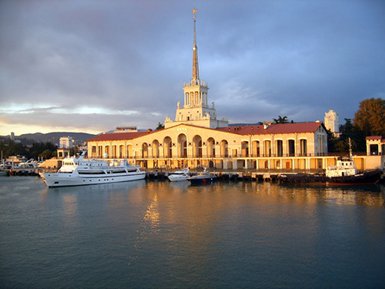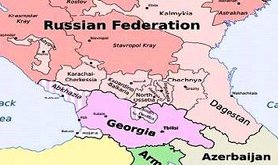In 2014, the popular Russian Black Sea resort city of Sochi will host the Winter Olympics, symbolizing Russia’s ever more confident profile on the international stage. The honor of hosting the Olympics is undoubtedly a huge opportunity for the host country, but it also brings with it a number of unusual domestic and foreign challenges. In particular, its location in the heart of what was once the homeland of the Circassians has galvanized a historically oppressed and largely deported nation into its primary goals of achieving genocide-recognition, repatriation and unification.

Sochi port: gateway to the Russian riviera, or a coffin full of painful memories (pic: jaunted.com)
Historic Circassia is today divided between several regions of the Russian Federation, but nobody forgets that its last independent capital was Sochi. The current-day resort’s port was the place from which the Circassians were deported to the Ottoman Empire. And the main centre for the 2014 games, Krasnaya Polyana (Kbaada in Circassian) was the place where, on May 21, 1864, a parade of Russian troops celebrated the end of the war against the Circassians. By an irony of history, the 2014 Winter Games mark the 150th anniversary of the Circassian defeat.
The Russian side accepts the historical facts. Like for example, the gruesome realities that Russian General Zass built a fence around his residence with Circassian scalps, that General Evdokimov put Circassian children left behind in a destroyed village into a pit and burned them alive, and that Circassians died in their thousands from hunger and thirst on the shore of the Black Sea, to where they were driven by Russian troops.
The problem has been the word people attach to these facts: whether to label the events as "genocide" or just plain "war". Russian politicians have up till recently played a measly-mouthed game, avoiding either denying or accepting the Circassian genocide. The most characteristic example of this “policy of silence” took place in January 2006 when some Circassian NGOs asked the Russian Parliament to recognize the Circassian Genocide in the 19th Century, to which the members of the Parliament replied that the Circassians were not among the people deported in Stalin’s time in the 20th century. While much attention was the comic side of this response, little comment was passed on the fact that members of the Parliament preferred to put themselves in a plainly ridiculous position than to give a negative answer.
This “policy of silence” was only broken in February this year, when the US Circassians launched Olympic protests during the Winter Olympics in Vancouver with a message to the world: “if you let the 2014 Games go on as planned in Sochi, you’ll be skiing on the graves of our oppressed ancestors”. The Russian Embassy in Washington, D.C., issued a response stating “there was no genocide of the Circassians” and that any such allegations “have no basis”.
"The Russian policy has up till recently been one of silence, broken only when US Circassians accused them of "skiing on the graves of ... ancestors"
An interesting angle to the affair was opened following the August 2008 Russian-Georgian conflict. After a war that effectively saw them lose disputed territories, Georgia developed what they called a “policy of symmetry” towards Russia: that is, a policy that sought to foster anti-Russian separatist movements in the North Caucasus. A Georgian parliamentary committee has, for example, already been established with a brief to build relations with the republics of the North Caucasus.
This spring, Circassian activists made use of this platform by asking the Georgian Parliament to officially recognize the Circassian Genocide. If Georgia did, in fact, decide to make such a move, it would put Russia in a difficult position: holding its Olympics in a land of a genocide newly recognized by a UN member state. It could become a thorn in Russia’s side in the same way that the recognition of the Armenian Genocide has been a source of great irritation to Turkey.
It should perhaps be mentioned apropos that although the recent trends in relation to the Circassian question have been primarily negative in Russia, there were some positive steps towards a proper recognition in the 1990s. The word “genocide”, for example, was used by the parliaments of Russian regions Kabardino-Balkaria (in 1992) and Adygeya (in 1996). In 1994, Yeltsin himself made conciliatory statements to Russian Circassians. So there are clear precedents Moscow could use if it decides to change policy.
There are however, a number of obstacles that lie in the way of such a change. The first thing to note is that the Circassian world has never tried to compromise with Russia. In simple terms, the Circassian demand can be expressed in the following: “Russia, you killed and exiled us, admit it!”
From the Russian point of view, there is also the issue of reparations, which recognition of the Circassian genocide would undoubtedly raise. Still nursing a hangover from crisis punch, Russians are not encouraged by the case of Germany, which has been paying for the Jewish Holocaust for decades. It would be a disaster for Russia if after the recognition of the Circassian Genocide similar demands from Cossacks, Tatars, Poles and others would follow. After all, the history of building the Russian Empire and the Soviet State is so full of such atrocities – committed against many different ethnic groups (including against the Russian people themselves) – that contemporary Russian leaders would not be able to pay everybody back even if they were willing.
"Russia fears that recognition of the Circassian Genocide would lead demands for reparitions… Russian and Soviet history is so full of such atrocities Russian leaders could not pay everybody back even if they were willing"
So where is the potential for moving things forward? Clearly much depends on establishing a consensus between Russia and the Circassian world. But there are also simple matters that would be beneficial to both sides.
First, I would argue that the Circassian side should remove Russian economic fears by renouncing any claims on pecuniary compensation. Second, all grievances should be dealt with in the form of an official document, taking the form of a Social contract. This should address the two main Circassian issues aside from the recognition of Genocide, i.e. repatriation and unification. I think there should be a law and state program to repatriate Circassian Diaspora to their homeland. And I think the Circassian regions should be merged into a unified Circassian Republic within the Russian Federation.
With long-standing problems resolved thanks to good will from both sides, one can only imagine the stabilizing impact such a united Circassian Republic would have on the south of Russia. In such a scenario, the occasion of Sochi 2014 can be moved from one that attracts negative, tense and sad emotions to a beautiful celebration of a new Russia, leading the way with a humane resolution to a long-lasting problem.
Read more
Get our weekly email



Comments
We encourage anyone to comment, please consult the oD commenting guidelines if you have any questions.